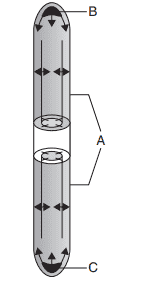1. Which of the following are characteristics of the cells in meristematic region?
a) Rich in protoplasm
b) Large nuclei
c) Thin plasma membrane
d) Both (a) and (b)
Explanation: Both (a) and (b)
2. Which of the following is not the characteristics of cell wall of meristematic cells?
a) Primary in nature
b) Cellulosic
c) Abundant plasmodesmata
d) None of these
Explanation: None of these
3. Where can we find cells representing the phases of elongation?
a) Root Apex
b) Shoot Apex
c) Cells proximal to both
d) All of these
Explanation: Cells proximal to both
4. Which of the following is not the characteristic of the cells in elongation phase?
a) Cell enlargement
b) New cell wall deposition
c) Decrease in volume
d) Both (a) and (b)
Explanation: Decrease in volume
5.Cells proximal to the phase of elongation show ________ .
a) Meristematic phase
b) Maturative phase
c) Elongation phase
d) All of these
Explanation: Maturative phase
6.What is A, B and C in the given figure?

a) A–Shoot apical meristem, B–Root apical meristem, C–Vascular cambium
b) A–Vascular cambium, B–Root apical meristem, C–Shoot apical meristem
c) A–Root apical meristem, B–Vascular cambium, C–Shoot apical meristem
d) A–Vascular cambium, B–Shoot apical meristem, C–Root apical meristem
Explanation: A–Vascular cambium, B–Shoot apical meristem, C–Root apical meristem
7. Cells of maturative phase show
a) Thickening of walls
b) Protoplasmic modification
c) Both (a) and (b)
d) None of these
Explanation: Both (a) and (b)
8.Increased growth per unit time is called
a) Growth rate
b) Growth speed
c) Both (a) and (b)
d) None of these
Explanation: Increased growth per unit time is called Growth rate.
9.The growth rate shows an increase that can be
a) Mathematical
b) Arithmetic
c) Geometrical
d) Both (b) and (c)
Explanation: Both (b) and (c)
10.In arithmetic growth, other than daughter cells, what happens to the other cells?
a) They undergo maturation
b) They undergo differentiation
c) Both (a) and (b)
d) They undergo continuous cell division
Explanation: Both (a) and (b)